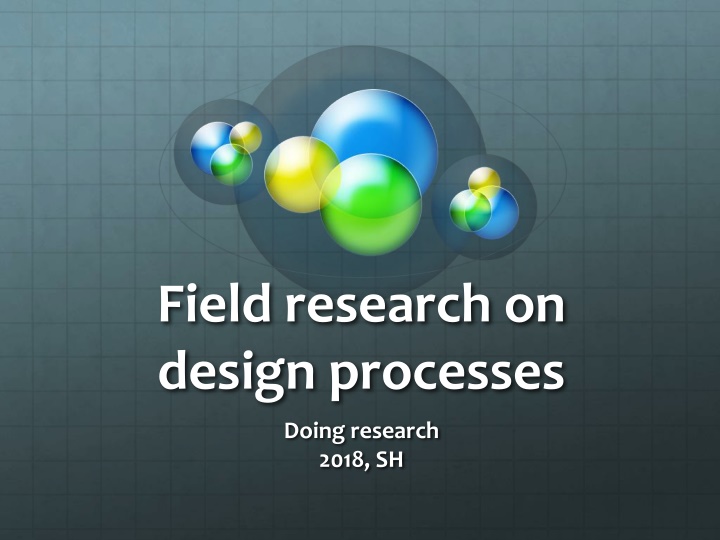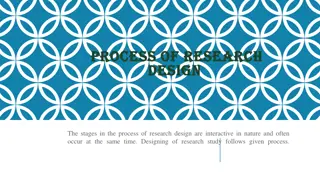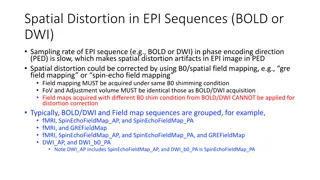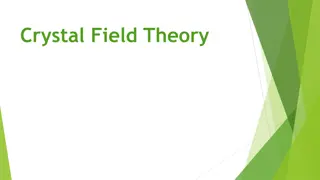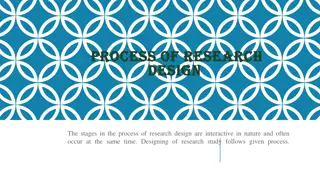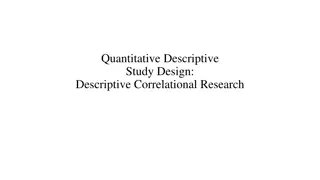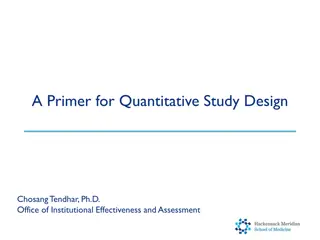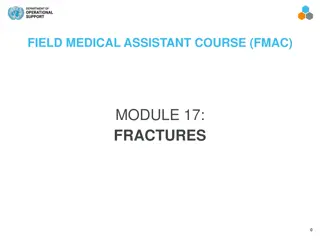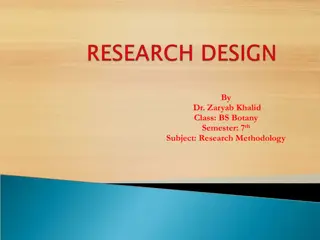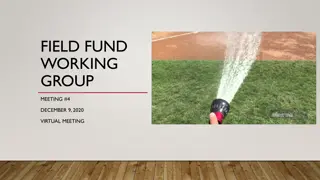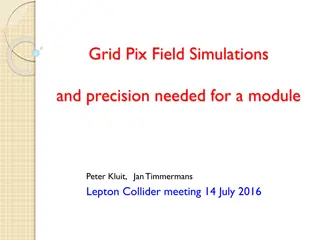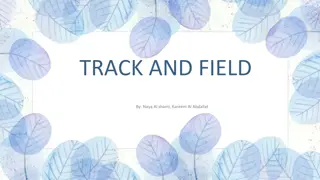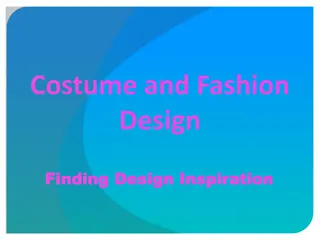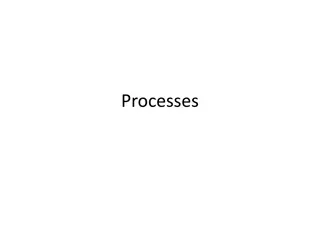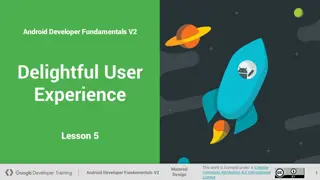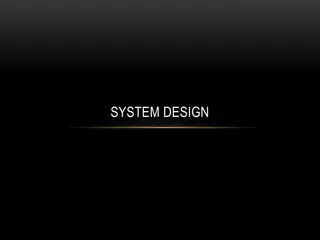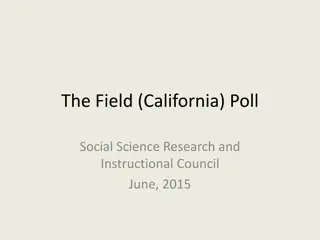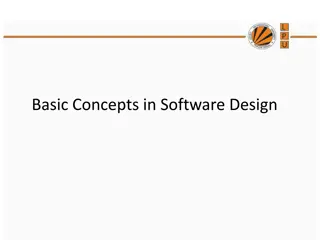Field Research on design processes
Exploring the importance of field research in design processes, this content delves into reasons for conducting research, types of data collection methods, and the scale of design projects and practices. It also touches upon the significance of empirical data in designing and making informed decisions.
Download Presentation

Please find below an Image/Link to download the presentation.
The content on the website is provided AS IS for your information and personal use only. It may not be sold, licensed, or shared on other websites without obtaining consent from the author.If you encounter any issues during the download, it is possible that the publisher has removed the file from their server.
You are allowed to download the files provided on this website for personal or commercial use, subject to the condition that they are used lawfully. All files are the property of their respective owners.
The content on the website is provided AS IS for your information and personal use only. It may not be sold, licensed, or shared on other websites without obtaining consent from the author.
E N D
Presentation Transcript
Field research on design processes Doing research 2018, SH
Why bother? Nothing as frustrating as I participated as a designer in this process/organizational change/course, I felt it went like this and it was important (reject) No data = no research One of the clearest design dissertations is to follow how X happens in real life: design is multifarious and there is little well documented research on its different aspects (vs. airport design books vs. pretty picture catalogue/manifesto/reflection) Good backbone for design construction / design intervention Normative questions can be better discussed from having some solid empirical seat to speculate from.
How bother? Multiple orientations possible, ranging between Clear unit of analysis from the start e.g. Ylirisku: framing of design problems in different design projects Interesting case for a theme: sharp focus/foci to emerge: SH health tech firm user orientation A realization that something really interesting happened how to turn that into valid research?
Types of data collection Just now occurring: observation, talk, materials (A)round (and) about now occurring: Interviews, materials, observations Sometime ago occurring: Interviews, documents, artifacts, digital traces, articles, newspapers Long time ago occurring: documents, artifacts etc. supported interview remembering
Scale of practice: Evolvement of safety alarm and monitoring systems (for elders) Scale of a development project: Vivago-Wristcare 1992-2009-- Scale of particular design projects: months and years Design & redesign of 1st version Design of 2nd version Design of 3rd version Research 1999-2003 Follow up 1 Follow up 2 1 version in use 2 version in use 3 version in use Scale of ICT appropriation projects: Months and years Scale of a new type of organization: Palvelutalo for elders 1995- Scale of practice: Evolvement of elderly care and living
Just now occurring Observational data: meetings, design moments, prototyping, implementations, everyday work What can you have access to? What can you get to (on time)? What all do you wish to follow? (tbc) Study subject self documenting Meeting memos, pictures, protocols, reports, artifacts Access to online traces, video capture on-line Access to emails Interviewing / talk : what are you doing, what have you been doing? What is the meaning of what is taking place etc etc etc
Just Now occurring The curse and delight of multi-cited ethnography: you cannot be everywhere at once; choose The most obviously potentially interesting moments/people/ places Round up view: to get a sense of what else is interesting Find adequate extent/intensity with which you are there in a location // a way to do your related work while waiting Be prepared to change focus, tacktic, mode, site, RQ as the study unfolds: often you find what you did not think you would find Pre-study / own experience to get a sense what and how to look for Think which observational methods are most suited to getting data & recording it (place, shadow, participant ) RECORD: field notes each damn field day (min hour, 1:1 good rule); Video when you can; audio when you can; annotate/tag these as much as you can: be collector! Have someone to talk to about your findings (out of immersion) // develop a diary relation with yourself
Round about now occurring Multi-sited ethnography/ moving / rapid context ethnography hard to observe Interviews give you accounts of what has been going on: what have you been up to etc etc Study subject self documentation accentuated Intertwine interviews with documention/artifacts that you get Try to do fairly frequent updates to stay on track Intensive in-depth immersion period helps follow-on updates (trust, acquaintance, knowing the local tricks ) If intertwining with observation you can change the focal site to be observed and meanwhile keep track on other sites by interviews Pay attention to how you get your interviews transcribed + still write short field notes and research memos
Retrospective materials Documents / Artifacts / digital traces gain dominance : anchor analysis and anchor study subject memory in talk Interviews work well to get meanings, retrospective evaluations, overall contours of events Account exactness relative to topics and research interests: augmented from documents when weeks or months pass, after years people easily misplace an event by 2-3 years but can still describe it well. After a 7 years turning point in memorizing: just memorable events // more fuzzy what gets included Archival and other documents dominate after that
Planning fieldwork Initiation strategies: No planning: plunge! Map stakeholders, get permissions, gain introductions, do a prestudy, make a plan Just change your role to a researcher All have merits and dismerits Start with what you obviously need anyway (even if boring) or with what is just now insanely interesting Don t start many lines of enquiry simultaneously: you just can t do it
Continuance issues Always plan for two or more interview rounds: acquaintance + issues not first figured out to ask Aim to zero on one (or several but clearly delineated) unit(s) of analysis as the study matures Don t despair if reality doesn t allow you to do this Seek to triangulate when possible Quantify and operationalize concepts / change process if sensible Seek to clarify what (all) is your case a case of and how exactly Evaluate if your research question still makes sense and can be answered? Or should it be sharpened or reiterated (beware endless research question drift, though)
Continuance issues 2 Don t just wait for the data to pile up (but getting data can be 150% of your work time and that is fine!) Active memoing Use theoretical sampling , gather more / deeper material on issues and topics that are paricularly interesting Write ideas/synopsees for articles Begin analyses on the data (data overviews / coding) Be ready to iterate your work (but remember accumulation!!) Read other peoples work (if you have time) Push aside other duties / remember masters students for smaller modules / professors and seniors for context pieces
Try different angles Say you have video material that is rich in detail or you are out in the field making observations Focus on one theme at the time such as How are these people using artifacts Do they follow customs or formal rules, if so how How is their social interaction patterned Do they collaborate How do they take use of the space .
Active memoing Write memos, short and long ones, on issues you note and things you think may be relevant No data = no research Lots of data = drowning in data The half life of memory is 24hours Ideas come, most go Memo s help give a trace to the data: what happened, what may be interesting, what to pay attention to in the future A reflexive relationship with yourself about the research & allows others to enter the reflexion as well. In memo s differentiate what you observed and what you think happened and what was behind the action; you can write different types of memos or different sections into your notes.
Write analysis / article ideas Helps to clarify why something that may be interesting in the data could be interesting (most is, after all, not & some things will be definitely more interesting) play with conditionals: if you could study this it would be good, would it not. Most ideas are crappy -- You need just a few ok ones
Begin analyses on data Trying out analyses reveals If they are doable If they yield anything of interest What else could be interesting to study How else could you analyse Organize data what is happening here : Begin listing themes in-vivo: themes and terms that your informants use naturally ex-vivo: themes and terms that research literature suggests Begin sorting the material into these Try differnent angles Try connecting themes / bodies of data to see relations
Theoretical sampling theoretical sampling = gather more / deeper material on issues and topics that you think are particularly interesting Can arise from the material: a theme or angle that appears particularly salient Often informed by researchers background Or theoretical understanding, e.g. about human sociality or of design processes Some are loathe of theoretical sampling: if taken to extreme it skews the data to researcher interest
Moving analysis forward Field resarch III
Theoretical Saturation The continuation of sampling and data collection until no new conceptual insights are generated. At this point the researcher has provided repeated evidence for his or her conceptual categories. Theoretical saturation is associated with theoretical sampling for grounded theory , that is, the selection of cases that are most likely to produce the most relevant data that will discriminate or test emerging theories. This process requires a flexible approach to data collection as it progresses alongside data analysis. Theoretical sampling has the potential to be limitless. This should perhaps be unsurprising as the inductive method of theoretical development suggests that each new case has the potential to offer a slightly alternative insight.
Question-Theory-Empirics interplay Solely inductive research may not answer at all what you seek answers to there is no guarantee whatsoever that something interesting will emerge (endless saturation quest) Soley deductive testing research is not very explorative and easily just verifies ones constructs (closing off richness) Typically an iterative relation is successful
Path finding checks Are theoretical constructs and/or research questions finding correlates in the empirical field? If not, are you in a wrong place or doing the wrong thing; why should they feature here? If they clearly should (what is the evidence?), are the constructs flawed, too narrow or biased? If so, should something else be studied instead, what then?
